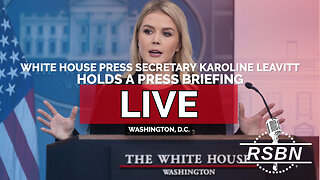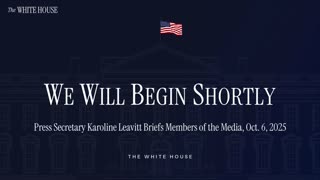Premium Only Content

Episode 3232: When Bishops act like Politicians and become Wolves instead of Shepherds
www.catholic-reboot.com
Nightly Zoom Coordinates for Rosary:
Meeting ID: 865 8978 0399
Passcode: Wjjv4960!
Speak Lord for your Servant is Listening
Book Recommendation of the Day
St. Vincent of Lerins – Commonitorium
• This 5th-century text is where the famous principle comes from:
“In the Catholic Church itself, we must hold fast to that which has been believed everywhere, always, and by all.”
• It was written precisely to warn against novelties in doctrine and the danger of bishops who confuse the faithful by introducing change.
• It shows how to discern true teaching (Tradition) from false teaching disguised as “progress” very applicable to synodality, false equivalence of moral issues, and the watering down of doctrine.
When Shepherds Speak Like Politicians and Turn into Wolves
Today we confront a matter that strikes at the very heart of Catholic life and faith: the role of our shepherds.
We’re focusing on Cardinal Blase Cupich’s recent remarks surrounding the Keep Hope Alive Award. On the surface, his words might seem pastoral, but in reality, they reveal something more troubling a shift in bishops behaving more like politicians managing factions than like apostles proclaiming truth.
For Traditional Catholics, this is not just concerning it is alarming. A bishop is called to sound like a prophet of Christ, not like a campaign manager looking for consensus.
Segment 1: False Equivalence: Abortion vs. Immigration
Cardinal Cupich warned against becoming a “one-issue Church,” equating abortion with immigration policy.
But this is a false equivalence.
• Abortion is an intrinsic evil condemned always and everywhere. As Pope John Paul II taught in Evangelium Vitae:
“Among all the crimes which can be committed against life, procured abortion has characteristics making it particularly serious and deplorable… It is always gravely immoral.”
• Immigration, however, is a prudential matter subject to policy debates and circumstances.
By conflating the two, Cupich diminishes the unparalleled gravity of abortion, treating the slaughter of the unborn as one issue among many.
Archbishop Lefebvre once said:
“The greatest service we can render to society is to remain faithful to the truth. To confuse the natural order with the supernatural, or to place prudential issues on the same plane as moral absolutes, is to betray both society and the Faith.”
This is why Traditional Catholics reject such rhetoric. It clouds moral clarity.
Segment 2: Selective Praise of Politicians
Cupich insists “total condemnation is not the way forward,” defending the honoring of Senator Dick Durbin, a well-known pro-abortion politician.
But public honor given to those who defy Church teaching causes scandal. St. Paul warns us:
“Do not be deceived: bad company corrupts good morals” (1 Cor 15:33).
St. Pius X also cautioned:
“The greatest obstacle in the apostolate of the Church is the timidity or weakness of her ministers… it is better to be hated for speaking the truth than to be praised for betraying it.”
A shepherd does not hand awards to wolves. He guards the sheep. To do otherwise betrays the mission of Christ.
Segment 3: Synodality as Political Strategy
Cupich promotes synodality as the path forward, echoing Pope Francis’s vision. But synodality as practiced today often looks more like parliamentary democracy than apostolic tradition.
St. Vincent of Lerins taught:
“In the Catholic Church itself, we must hold fast to that which has been believed everywhere, always, and by all.”
Truth is not decided by votes. Archbishop Lefebvre rightly observed:
“The Church is not a democracy where truth is decided by vote. Truth has been given to us once for all by Christ.”
Dialogue may clarify, but it does not redefine doctrine. Synodality risks turning eternal truth into a political negotiation.
Segment 4: Acting as a Politician, Not a Shepherd
Look at Cupich’s tone: “politically homeless Catholics,” “finding common ground,” “partisan divides.” These are the words of a campaign speech, not the exhortation of a bishop.
St. Pius X wrote:
“The priest must be a man of God, not a man of politics. Once he places human opinion above divine law, he ceases to be the salt of the earth.”
Apostles did not speak to please crowds. They spoke to convert them. Today’s faithful need clarity, not compromise.
Segment 5: The Traditional Catholic Response
So how do we respond?
1. Clarity over compromise – Abortion is the defining moral crisis of our age. It cannot be equated with secondary issues.
2. Faith over politics – As Pius X warned, “Our faith is not subject to negotiation.”
3. Fidelity over fear – Lefebvre reminded us: “We do not cling to Tradition out of nostalgia, but out of fidelity. If we abandon what the Church has always taught, we abandon Christ Himself.”
Segment 6: The Role of a True Shepherd
Christ defined shepherding in John 10:
“The good shepherd giveth his life for his sheep.”
St. Gregory the Great wrote in his Pastoral Rule:
“The ruler should be a pure channel of heavenly waters, not a muddy stream of earthly politics.”
Think of St. Pius X, who confronted modernism head-on, calling it the “synthesis of all heresies.” He did not manage scandals; he condemned errors. That is a true shepherd.
Segment 7: The Cupich Crisis
Cupich’s hostility toward the Traditional Latin Mass is more than liturgical preference it is a rejection of memory and identity. The Mass of Ages connects us to saints and martyrs across centuries.
Beyond liturgy, Cupich embraces worldly ideologies, promoting dialogue with the world while silencing defenders of Tradition.
This is betrayal. A shepherd is meant to feed the flock, not hand them over to wolves.
Segment 8: Pope Leo XIV’s Response
How has Pope Leo XIV responded? With ambiguity.
Instead of correcting Cupich, he speaks vaguely. Instead of defending Tradition, he permits confusion.
What Pope Leo XIV has said
On the Cupich-Durbin controversy
• When asked about the Archdiocese of Chicago’s decision to honor Sen. Dick Durbin a pro-abortion Catholic politician Pope Leo XIV said he was “not terribly familiar with the particular case.”
• He emphasized the need to evaluate a public figure’s entire record: “it is very important to look at the overall work that a senator has done … 40 years of service in the United States Senate.”
• He acknowledged “difficulty and the tensions,” but added that we must consider “many issues that are related to the teaching of the Church.”
• He made two pointed moral observations:
• “Someone who says I am against abortion but is in favor of the death penalty is not really pro-life.” “Someone who says I am against abortion but I am in agreement with the inhuman treatment of immigrants … I don’t know if that’s pro-life.”
• He qualified: “They are very complex issues. I don’t know if anyone has all the truth on them.”
• He urged “greater respect for one another” and proposed that Catholics and citizens search together for moral clarity: “we need to be close to all these ethical issues and find the way forward as a Church.”
• He also affirmed that “Church teaching on each one of those issues is very clear.”
On immigration and life issues more broadly
• In comments on U.S. politics, he criticized what he called “inhuman” treatment of immigrants, linking it to the broader pro-life ethic.
• He sought to highlight contradictions: e.g. opposing abortion but supporting capital punishment or harsh immigration policies is not coherent with a full pro-life stance.
Lets stop right here. I thought the church made it clear on abortion, capital punishment and immigration? Why all of a sudden is this pope and the pope before him getting amnesia. Could it be $ related?
Capital Punishment
• Sacred Scripture & Tradition
Both the Old and New Testaments acknowledge the legitimacy of the death penalty in principle (e.g., Romans 13:4, where St. Paul says the ruler “beareth not the sword in vain”). The Church has always recognized the state’s right to use capital punishment for grave crimes, though also urging mercy.
• Pope Innocent III (1210)
In a profession of faith required of the Waldensians, he affirmed:
“The secular power can, without mortal sin, exercise judgment of blood, provided it proceeds out of zeal for justice, not hatred, with prudence, not precipitation.”
• Pius XII (1939–1958)
He explicitly defended the legitimacy of capital punishment as an act of justice and expiation:
“Even in the case of the death penalty the State does not dispose of the individual’s right to life. It is then reserved to the public authority to deprive the condemned man of the enjoyment of life, in expiation of his crime, after he has deprived himself of his right to live.” (Address to Catholic jurists, 1952)
• John Paul II (1995, Evangelium Vitae)
He did not deny the legitimacy in principle, but said it should be “rare, if not practically nonexistent” in modern conditions.
• Benedict XVI largely followed JPII’s prudential stance.
• Francis (2018) went further, attempting to change the Catechism to declare the death penalty “inadmissible.” This break with Tradition is a major flashpoint for traditional Catholics, since prior popes affirmed its legitimacy as part of natural and divine law.
2. Immigration and Borders
• Leo XIII (1878–1903) – in Rerum Novarum and other writings, he upheld the right to migrate for just reasons (seeking work, safety), but also affirmed the rights of nations to preserve order and the common good. He stressed that immigrants must respect the laws and culture of their host country.
• Pius XII (1939–1958) – in Exsul Familia Nazarethana (1952), he defended the rights of refugees and displaced families after WWII. But he also taught that immigration is not an unlimited right: states may regulate it for the sake of their citizens, though they should be generous when possible.
• John XXIII (1963, Pacem in Terris) – emphasized the right to emigrate and immigrate but balanced it with the duty of states to protect their borders and the common good.
• John Paul II & Benedict XVI – both frequently encouraged generosity to migrants, but always under the principle of the common good, not indiscriminate acceptance.
3. Traditional Catholic Perspective
From the traditional standpoint:
• Capital Punishment – Historically affirmed as morally legitimate and sometimes necessary, even if in practice prudence can restrict its use. No pope before Francis ever denied its legitimacy.
• Immigration – The Church teaches both charity toward the stranger and justice toward the nation’s citizens. Unlimited, unregulated migration has never been endorsed; instead, Catholic teaching emphasizes a balance between helping those in need and preserving the integrity and stability of the nation.
Regarding the Durbin award controversy, Pope Leo said it's “very important to look at the overall work” of a senator and urged that ethical issues be examined in their totality rather than reduced to a single voting record.
What Pope Leo XIV has not said (or no evidence found)
• I found no direct public statements from the Pope specifically condemning, criticizing, or defending Cardinal Cupich’s action in overtly harsh terms (e.g. accusing him of scandal, error, or betrayal).
• There is no record (so far) of Pope Leo XIV addressing Durbin’s support for abortion in a purely doctrinal corrective or warning sense (e.g. denying him Communion).
• He has not used particularly strong, explicit language against Cupich in public remarks—rather, his tone is more reserved, calling for nuance, respect, and broader evaluation.
Analysis & Observations
• Pope Leo XIV’s responses are tempered and diplomatic. He does not avoid moral points (e.g. pointing out contradictions in so-called “pro-life” stances), but he also avoids publicly naming Cupich or Durbin as guilty of scandalous behavior or doctrinal error.
• He seems to be seeking a “both/and” balance — acknowledging the criticism, recognizing tensions, and urging Catholics to examine complex moral issues in their fullness.
• His insistence that Church teaching “is very clear” while also conceding “I don’t know if anyone has all the truth” gives him room to affirm doctrine yet maintain a posture of humility and dialogue.
• For those who fear ambiguity or silence from Rome, his approach might seem too cautious. But for others, it may appear as a pastoral attempt not to inflame divisions further.
Isaiah warns:
“His watchmen are blind: they are all ignorant, dumb dogs not able to bark” (Isaiah 56:10).
Contrast with past Popes:
• Gregory VII excommunicated emperors.
• Innocent III confronted kings.
• Pius V excommunicated Elizabeth I.
But Pope Leo XIV issues statements that sound more like UN addresses than apostolic decrees.
Segment 9: The Political Pope
Why this weakness? Because too many modern Popes act as global politicians rather than spiritual fathers.
Their priorities seem to be image, diplomacy, and media approval, rather than defending the flock. But Christ commanded Peter: “Feed My sheep,” not “Manage the headlines.”
As St. Paul said:
“Woe is unto me if I preach not the Gospel” (1 Cor 9:16).
When Popes fear offending the world more than offending God, they abandon their mission.
Segment 10: What the Faithful Must Do
So what can we do?
History shows renewal begins with the faithful remnant.
• In the Arian crisis, laity and saints like Athanasius preserved the Faith.
• In the Protestant revolt, Catholic families preserved the Rosary and devotion to the Eucharist.
Our task today:
• Pray the Rosary daily.
• Teach our children the Traditional Faith.
• Support faithful priests.
• Study the Baltimore Catechism and pre-Vatican II encyclicals.
• Above all, cling to the Traditional Latin Mass.
This is our anchor.
Conclusion
Cardinal Cupich speaks like a politician, not a shepherd. Pope Leo XIV fails to correct him, speaking with vagueness rather than apostolic courage.
But Christ promised: the gates of hell shall not prevail.
Our mission is clear: remain steadfast in Tradition, hold to the truth handed down, and never abandon Christ for political compromise.
As St. Paul exhorted:
“Stand fast; and hold the traditions which you have learned” (2 Thess 2:15).
Epistle – Ecclesiasticus 44:16–27; 45:3–20
"Enoch pleased God, and was translated into paradise... Abraham was great by reason of his faith. Isaac and Jacob established the covenant. Moses was beloved of God and men... He sanctified him in his faith and meekness, and chose him out of all flesh. He heard him, and his voice. And He brought him into the cloud. And He gave him commandments before His face, and a law of life and instruction."
Reflection on the Epistle
This passage from Ecclesiasticus exalts the patriarchs and priests who faithfully served the Lord, men chosen not for worldly power but for fidelity. They lived in covenant with God, walking in faith and obedience, often amid trial.
The Church presents these examples today to remind us that we too live under a covenant sealed not in the blood of animals, but in the Precious Blood of Christ. To be part of this covenant is both privilege and responsibility.
St. Remigius embodies this fidelity. He shepherded not only his diocese but, through the conversion of Clovis, became the spiritual father of a nation. Like Abraham, he believed in God’s promises. Like Moses, he taught God’s law with courage. And like the patriarchs, his fidelity bore fruit that outlived him, shaping the Christian identity of a people for centuries.
For us, the lesson is clear: God calls us to fidelity, no matter our station. Parents, priests, workers, rulers all are stewards of God’s covenant and must live in obedience and witness.
Gospel – Matthew 25:14–23
"For it is as a man going into a far country, who called his servants and delivered to them his goods... And he that had received the five talents came, and brought other five talents, saying: Lord, thou didst deliver to me five talents, behold I have gained other five over and above. His lord said to him: Well done, good and faithful servant, because thou hast been faithful over a few things, I will place thee over many things: enter thou into the joy of thy lord."
Reflection on the Gospel
The parable of the talents is a sober reminder that all we have our gifts, our faith, our time is entrusted to us by God. The faithful servant multiplies what he has been given; the slothful servant hides his gift, squandering it.
This is not only about natural abilities, but above all about grace. God entrusts to us His truth, His sacraments, His charity and He expects us to bear fruit.
St. Remigius, by his preaching and pastoral courage, multiplied the talents entrusted to him. He could have lived a quiet episcopal life, but instead he boldly catechized and baptized a pagan king, setting a whole nation on the path of faith. His talents bore a hundredfold.
For us, the challenge is to examine: what talents has God entrusted to me? Have I buried them through fear, sloth, or compromise? Or do I, like the faithful servants, labor for the increase of souls and the glory of God?
Feast of St. Remigius
Born around 437, St. Remigius was consecrated bishop of Reims at the young age of 22. His long episcopacy bore immense fruit, most notably in the baptism of King Clovis in 496, often considered the “birth of Catholic France.” St. Remigius combined pastoral wisdom with missionary zeal, building churches, instructing clergy, and guiding his flock with humility and courage.
His feast is a reminder that the Church advances not by worldly calculation, but by bishops, priests, and laity faithful to their covenant and courageous in multiplying the gifts of grace entrusted to them.
Application for Today
• Live covenant fidelity: Like the patriarchs, live daily in obedience to God’s commandments and trust in His promises.
• Multiply your talents: Use the gifts of grace—prayer, sacraments, opportunities for charity—for the salvation of souls.
• Embrace missionary courage: Like St. Remigius, do not be afraid to proclaim the Faith, even when it means confronting unbelief or hostility.
• Seek eternal reward: Remember the words we all long to hear: “Well done, good and faithful servant.”
________________________________________
Conclusionary Prayer
O God, who didst adorn blessed Remigius, Thy Confessor and Bishop, with apostolic virtues and zeal for souls, grant that through his intercession we may remain faithful to Thy covenant, multiply the gifts Thou hast entrusted to us, and so one day hear Thy words: “Well done, good and faithful servant, enter thou into the joy of thy Lord.”
St. Remigius, pray for us.
Sacred Heart of Jesus, have mercy on us.
Immaculate Heart of Mary, intercede for us.
-
 LIVE
LIVE
Right Side Broadcasting Network
3 hours agoLIVE: White House Press Secretary Karoline Leavitt Holds a Press Briefing - 10/6/25
4,649 watching -
 LIVE
LIVE
Sean Unpaved
59 minutes agoPoll Plunge & Mile-High Mayhem: Texas & Penn State Crash, Sunday's Fireworks, & Broncos Stun Eagles'
207 watching -
 LIVE
LIVE
Dear America
40 minutes agoEp 4 Graham Allen Show
1,203 watching -
 LIVE
LIVE
Dr Disrespect
1 hour ago🔴LIVE - DR DISRESPECT - BLACK OPS 7 - GIVE ME BACK MY NUKE
1,416 watching -
 LIVE
LIVE
The White House
46 minutes agoPress Secretary Karoline Leavitt Briefs Members of the Media, Oct. 6, 2025
1,000 watching -
 1:01:20
1:01:20
Timcast
1 hour agoTexas National Guard DEPLOYED To ILLINOIS, Governor Declares INVASION
38.1K40 -
 LIVE
LIVE
The Charlie Kirk Show
1 hour agoThe Killer AG + Kav Assassin's 8 Years + The Battle of Portland | Hemingway, Davis | 10.6.2025
9,738 watching -
 2:06:01
2:06:01
Steven Crowder
4 hours agoDeport Them All: Trump Takes Fight to Leftist Chicago & Portland Over Attacks on ICE
201K235 -
 1:01:46
1:01:46
The Rubin Report
2 hours agoBill Maher’s Crowd Stunned as Van Jones Gives a Brutal Message to Liberal Media
23.8K45 -
 LIVE
LIVE
Nerdrotic
3 hours agoHollywood Will EAT Itself | Amazon BENDS The Knee to 007 Fans - Nerdrotic Nooner 524
436 watching
